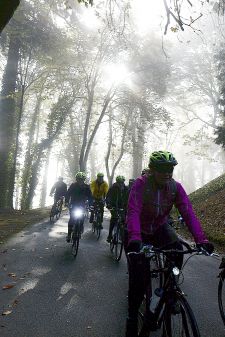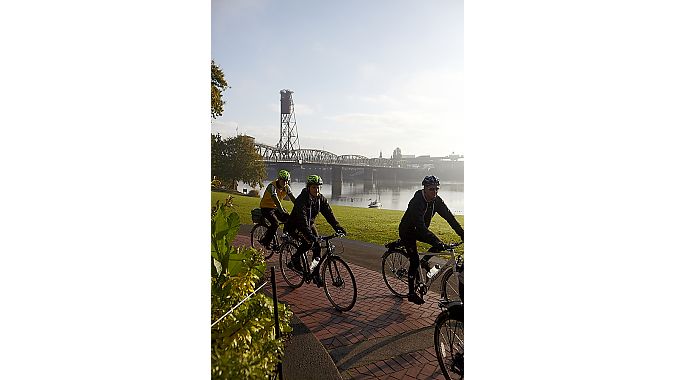PORTLAND, OR (BRAIN) — Dealer Tour riders set out on the third and final day of visits in Portland under foggy conditions and temps in the low 40s. But within hours, the clouds cleared bringing temps up to the mid 50s, but no rain.
Heading out to swanky Lake Oswego, River City’s Alex Criss, our guide for the day, took us through scenic bike paths along the Willamette River. We climbed through the Tryon Creek State Park up to the River View Cemetery. We rode across the Sellwood Bridge and took the Springwater Trail back to Portland, racking up the most miles of any day here in the City of Roses, about 20 or so, out and back.

Here’s a recap:
Lakeside Bicycles
Seven miles outside the city, Lakeside Bicycles caters to high-end roadies with Colnago, Pinarello, Bianchi and Pegoretti bikes displayed in a century plus old building located on Lake Oswego’s busy Highway 43. Gordon Haber rolls 400 to 500 bikes out the door every year with an average selling price of about $1,750. That’s down from about $2,250 before business slowed with Portland’s economic downturn following the dot com bust, then the start of the recession in 2007.
Increased price competition from the rash of new shops opening in the city has also tempered business for Haber, whose shops pulls in about $1 million annually now, compared to $1.5 million in boom times. Haber has gotten creative to remain competitive in the face of pricing pressure and eroding margins.
He attends the Eurobike trade show every year to seek international brands that can differentiate his shop from the rest of the pack. As an example, he recently picked up Maloja, a small German apparel manufacturer, popular in Europe but rarely seen in the U.S. “That’s been our most successful women’s clothing brand,” Haber said.
Sellwood Cycle
Walking into Sellwood Cycle Repair, there is so much to see, it’s difficult to decide where to rest your eyes first. Tilt your head back to take in the dozens of new and used bikes suspended from the ceiling on a pulley system, stare ahead at the row of mechanics tinkering behind their work stands in the shop’s center, or gaze down to watch the shop’s puppy scamper around the recycled rubber floor. It’s all part of the character of the shop, a longtime staple on Portland’s cycling scene.
Sellwood built its foundation two decades ago on selling consignment bikes and it has stayed a significant part of the business, contributing about 50 percent to the shop’s $1.5 million in annual sales. Owner Erik Tonkin, a former Kona Factory Team rider, U.S. cyclocross world championship team member and a well-known and respected figure in Portland’s cycling circles, has been a partner in the business since 1999 and sole owner since 2009. His unique financial and management philosophy allows him to run the business the way he sees fit without being beholden to specific suppliers—although Sellwood happens to be one of Kona’s largest dealers—or banks.
The business is debt free (except for a small mortgage on the building) and reinvesting profits back into the operation is the top priority. When Tonkin moved into a new space, five times the size of Sellwood’s longtime location in the height of the recession, he was able to pay half the asking price in cash. The staff of 12 is all paid between $14 and $16.50 an hour, including himself, which eliminates a management hierarchy and allows more money to go back into the shop.
And it seems to be working, Sellwood has seen annual sales growth of 25 to 30 percent over the last few years and has little to no employee turnover in the highly competitive Portland bike retail employment market.
River City Bicycles
Dave Guettler’s River City Bicycles offers the attention to detail and service of a mom-and-pop shop but the selection of a big-box retailer. No fancy POS system here—“we’re more human-based than data-based,” Guettler said.
Guettler started the business in 1995, opening on busy MLK Boulevard, in what at the time was a shady neighborhood. But he saw the potential—a centrally located building with “amazing freeway access, a parking lot, and 65,000 cars driving by a day.”
Guettler, 55, is a self-described bike geek, evident in the collection of vintage bikes that hang from his ceiling: a 1975 Exxon Graftek, a 1973 Mossberg and a 1976 Teledyne Titan, among many others. A collection he’s amassed over decades. He’s a big fan of vintage Colnago bikes and built a small shrine to Eddy Merckx behind his Nossa Familia coffee bar. Originally from Detroit, Guettler said he didn’t even own a car until he was 26 years old.
Guettler cut his teeth in bike retail in the Bay Area, where he was part owner of Pacific Bicycle, a chain that at its height grew to 13 stores. During his years there he realized he would do things quite differently if he was in charge and after considering Seattle and Spokane, moved to Portland in ’94 because he thought it would afford him the kind of lifestyle he wanted. It also fit the demographic and population size he desired for his business.
Over the past 18 years he’s built a veritable bike empire consisting of a main three-floor store (10,000 square feet) with an indoor test track and outside BMX ramp where he can display up to 800 bikes; a 20,000-square-foot warehouse a block away which houses up to 1,500 bikes and several work stands for bike builders; a fit studio next to its main store (shared space with Alta Planning & Design); and an outlet store two blocks away where he sells closeouts. During a busy day in early spring, River City can easily crank out $100,000 in sales. And that’s in-store only—no Internet sales here.
But Guettler, a bass player and self-taught woodworker who’s built the display counters, coffee bar and brand signage throughout his store, is pretty humble about it all. “It’s about focusing on the basics,” he said. “The secret to our success is my staff—many have been with me 10 years or more. We offer them a job they can sink their teeth into.” He keeps his 60 or so employees happy by offering higher-than-industry-average wages, health benefits, profit sharing, commissions and other less tangible perks like beer and pizza lunches, free breakfasts and flexible schedules.
“I want to create an environment that’s great for the customers, the staff and me,” he said, plainly. And that reflects in growth despite a recent boom in local competition.
Clever Cycles
Fashionable step-through city bikes. Dutch- and Portland-built bakfiets. Folders from Brompton and Tern. … And eco-friendly hot tubs?
Clever Cycles, founded in 2007 with a focus on stylish transportation and cargo bikes, had long been importing bikes from the Netherlands when it found itself with some extra space in a shipping container bound for the States. Owners Dean and Rae Mullin and Todd and Martina Fahrner decided to fill it out with two Dutch Tubs, wood-burning heated tubs light enough to be hauled on bike trailers that the shop could rent out.
Todd Fahrner admits it was a quintessentially Portland thing to offer (“Portlandia” even skewered it in an episode on cable TV’s IFC network). But whimsy aside, Clever Cycles has built its business around the city’s utilitarian cycling needs, whether it be young commuters, car-less city dwellers wanting grocery haulers or, as Martina Fahrner puts it, the road rider who got married, started a family and now wonders, “What do I do with my kid on the bike?”
Martina emphasizes the importance of listening to what customers want out of a bike, then opening them up to new possibilities. For instance, a commuter might not ever consider that rather than a stylish mixte, their needs might be better met by a Surly touring bike fitted with swept-back bars to give them a comfortable riding position while also providing all the gears they’ll need for the ups and downs of city streets.
It’s all about instilling “brand evangelism” in customers—both for their chosen bike and, by extension, for Clever Cycles, noted Martina.
“We’re always learning,” she said. “It’s a long process. None of us had been in retail before. It’s just a labor of love.”






